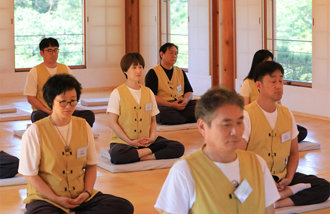[Editorial] Creating Job Is Most Urgent
[Editorial] Creating Job Is Most Urgent
Posted July. 18, 2008 08:07,
As the economic outlook darkens, a recently released employment index is enough to make anybody depressed. It says that the average number of job seekers in the first half of this year was 615,500, up 70,000 from last year and up about 300,000 from 2004. The number of those who just give up finding jobs despite their capability to work stood at 1.35 million. If the number of the official unemployment statistics of 784,000 is added to the two previous figures, the real number of unemployment reaches 2.75 million.
Creating jobs falls far short of expectation. The number of employed workers in June just increased by 147,000 compared to the same period of last year, the lowest increase in 40 months. The number of new jobs fell below 300,000 in August last year, and barely reached 200,000 since March this year. Some say the government would find it tougher to get the recently readjusted 200,000 target.
The strike by the Korean Transport Workers` Union (KTWU) was mainly responsible for the lack of new jobs in June. Their indiscreet refusal to work, along with the failure of the government to keep the agreement with the union from five years ago, dealt a serious blow to the overall economy and relevant jobs. The number of daily workers in driving and shipping went down by 10,000 to 20,000, reminding the harsh reality faced by the ordinary people.
Even when the economy was relatively good, the only bright spot in the employment index was a slight increase in the service sector figure. Job creation in manufacturing and construction was slow. At present, it can be attributed to corporate reluctance to hire more workers due to the decrease in employment flexibility and the economic downturn. Those who have vested interest in the labor market are just paying attention to enhancing working conditions for regular workers or extending the retirement age.
Given the situation, it is much harder to create jobs for 346,000 unemployed young people. In a survey conducted in 2006, 71 percent of the respondents said that labor movements are problematic because they protect only certain labor groups vested rights. Citizens negative perception of selfish trade unions is likely to intensify as we have witnessed the struggles of non-regular workers last year.
The unemployment rate of the European Union, which used to symbolize the European illness of high unemployment, was 7.2 percent in May, the lowest in 25 years. Many say that welfare reform and constructive changes of unions behaviors produced the impressive results. EU labor unions reached an agreement with corporations to create more jobs, while making concession to wage hikes and improving working conditions often aimed at protecting vested interests of some labor unions. Koreas unions should take lesson from their European counterparts in order to break the current economic impasse including unemployment.







